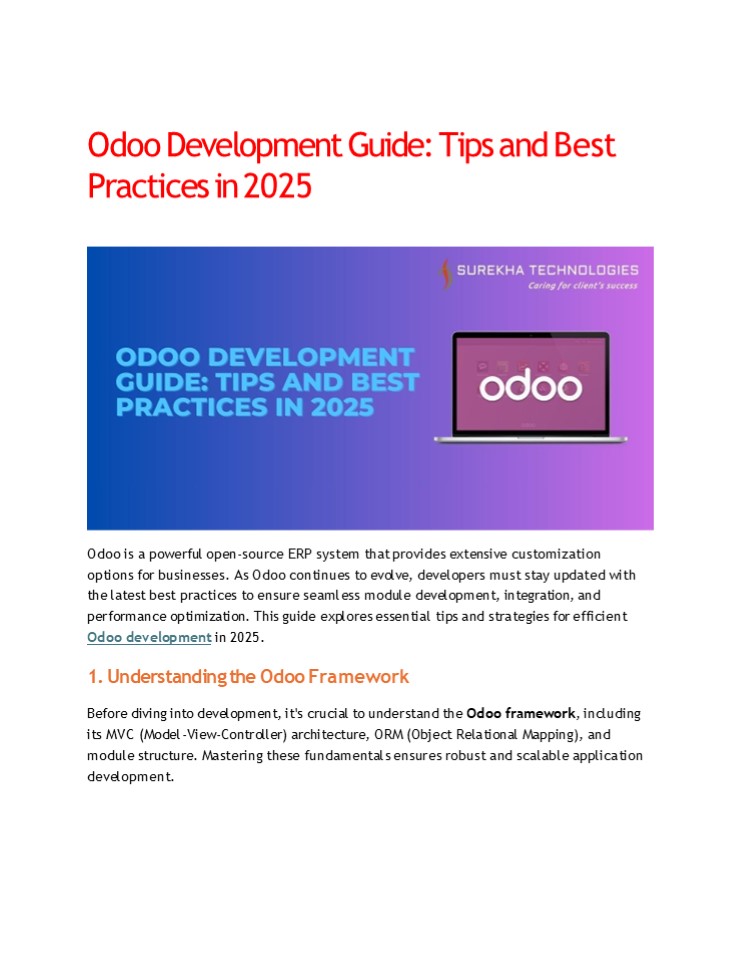Odoo Development Guide Tips and Best Practices in 2025 - PowerPoint PPT Presentation
Title:
Odoo Development Guide Tips and Best Practices in 2025
Description:
Odoo Development Guide 2025: Learn how to streamline your ERP projects with proven tips, best practices, and innovative solutions. – PowerPoint PPT presentation
Number of Views:2
Date added: 4 March 2025
Slides: 4
Provided by:
surekhatech
Category:
Medicine, Science & Technology
Tags:
Title: Odoo Development Guide Tips and Best Practices in 2025
1
Odoo Development Guide Tips and Best Practices
in 2025
Odoo is a powerful open-source ERP system that
provides extensive customization options for
businesses. As Odoo continues to evolve,
developers must stay updated with the latest best
practices to ensure seamless module development,
integration, and performance optimization. This
guide explores essential tips and strategies for
efficient Odoo development in 2025. 1.
Understanding the Odoo Framework Before diving
into development, it's crucial to understand the
Odoo framework, including its MVC
(Model-View-Controller) architecture, ORM (Object
Relational Mapping), and module structure.
Mastering these fundamentals ensures robust and
scalable application development.
2
- Best Practices for Odoo Module Development
- Follow Odoo Coding Standards Adhere to the
official Odoo guidelines to maintain consistency
and compatibility. - Use Odoo ORM Effectively Optimize database
queries using Odoos ORM to - improve performance.
- Modular Approach Develop reusable and
independent modules to facilitate better
maintainability. - Security First Implement proper access control
lists (ACLs) and record rules to prevent
unauthorized access. - Customization and Extensibility
- Inherit Views and Models Instead of modifying
core files, use model and view inheritance to
extend functionality without breaking future
updates. - Use Odoo Studio For quick, no-code
customizations, leverage Odoo Studio for workflow
automation and UI modifications. - Leverage API Integration Use Odoo API (XML-RPC
and JSON-RPC) to integrate third-party
applications. - Performance Optimization Tips
- Optimize SQL Queries Avoid excessive queries
and batch process data where possible. - Enable Caching Utilize Odoos built-in caching
mechanisms for faster response times. - Load Balancing s Scaling Deploy Odoo on cloud
environments with load balancing for high
availability. - Testing and Debugging in Odoo
- Use Odoo Logs and Debug Mode Monitor Odoo logs
to identify and fix issues. - Automated Testing Implement unit and functional
tests to ensure module stability. - Performance Benchmarking Regularly test module
performance under different workloads. - Deploying Odoo Applications
3
- Database Management Regularly back up databases
and optimize PostgreSQL settings for better
performance. - Monitor System Health Use monitoring tools like
Prometheus and Grafana for tracking server
performance. - Conclusion
- Odoo development in 2025 requires a combination
of best coding practices, security enhancements,
and performance optimizations. By following these
strategies, developers can build scalable,
high-performance Odoo applications that meet
business needs efficiently.

